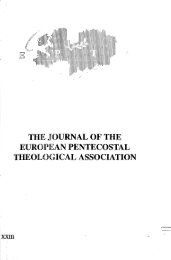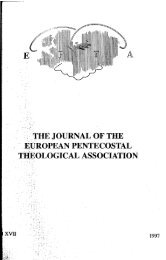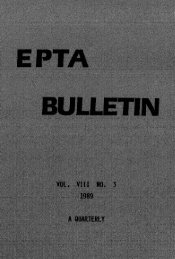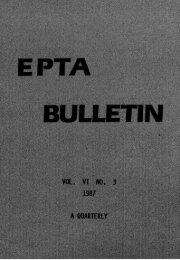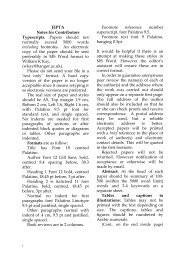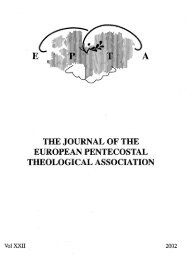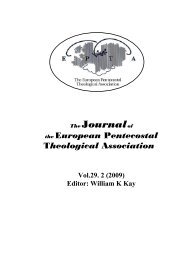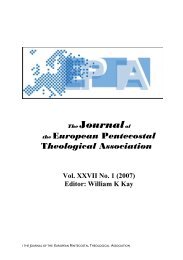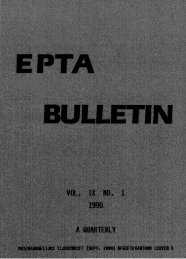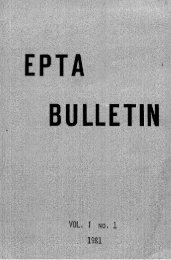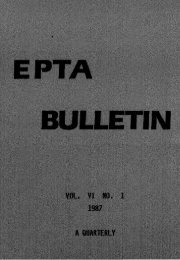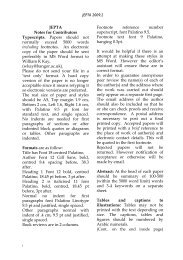jepta 2001 21 - European Pentecostal Theological Association
jepta 2001 21 - European Pentecostal Theological Association
jepta 2001 21 - European Pentecostal Theological Association
You also want an ePaper? Increase the reach of your titles
YUMPU automatically turns print PDFs into web optimized ePapers that Google loves.
The Journal of the <strong>European</strong> <strong>Pentecostal</strong> <strong>Theological</strong> <strong>Association</strong>, Vol. XXI, <strong>2001</strong><br />
of you will know about the recent release of the document titled Dominus Iesus.<br />
It was intended to be an internal document to provide clear boundaries that the<br />
bishops of the Roman Catholic Church could use as they seek to provide<br />
leadership on the important issue of interreligious dialogue. The document<br />
created quite a stir within the broader Protestant community for various<br />
ecumenical reasons. It also raised questions for members of other religions about<br />
the nature of Roman Catholic interests in interreligious dialogue. While we<br />
certainly take issue with the position adopted in the document vis- -vis the<br />
Roman Catholic doctrine of ecclesiology - though that position is consistent with<br />
what was adopted at the Second Vatican Council - the Christology of Dominus<br />
Iesus is clearly consistent with our own. Listen to the Congregation for the<br />
Doctrine of the Faith as it speaks of Jesus.<br />
The Church's universal mission is born from the command of<br />
Jesus Christ and is fulfilled in the course of the centuries in the<br />
proclamation of the mystery of God, Father, Son, and Holy<br />
Spirit, and the mystery of the incarnation of the Son, as saving<br />
event for all humanity.'<br />
As a remedy for this relativistic mentality, which is becoming<br />
ever more common, it is necessary above all to reassert the<br />
definitive and complete character of the revelation of Jesus<br />
Christ. In fact, it must be firmly believed that, in the mystery<br />
of Jesus Christ, the Incarnate Son of God, who is "the way, the<br />
truth, and the life" (Jn. 14:6), the fill revelation of divine truth<br />
is given: "No one knows the Son except the Father, and no one<br />
knows the Father except the Son and anyone to whom the Son<br />
wishes to reveal him" (Mt. 1 1 :27); ''No one has ever seen God;<br />
God the only Son, who is in the bosom of the Father, has<br />
revealed him" (Jn. 1 : 18); "For in Christ the whole fullness of<br />
divinity dwells in bodily form" (Col. 2:9-lo).*<br />
Ecumenical discussion between Roman Catholics and Lutherans over the past<br />
three decades has also led to clarifications on the issue of "justification by faith,"<br />
by which both the Roman Catholic Church and the Lutheran World Federation<br />
arrived at a consensus. While they did not lift the condemnations of earlier<br />
centuries, they did come to the common confession that "By grace alone, in faith<br />
in Christ's saving work and not because of any merit on our part, we are accepted<br />
by God and receive the Holy Spirit, who renews our hearts while equipping and<br />
calling us to good works."'<br />
Roman Catholic-<strong>Pentecostal</strong> Dialogue:Some <strong>Pentecostal</strong> Assumptions:<br />
Cecil M. Robeck, Jr.<br />
It is not, therefore, surprising to find that language consistent with this confession<br />
is used in Dominus Iesus,<br />
The proper response to God's revelation is "the obedience of<br />
faith" (Rom. 16:26; cf. Rom. 1:5; 2 Cor. 10:5-6) by which man<br />
freely entrusts his entire self to God, offering "the full.<br />
submission of intellect and will to God who reveals" and freely<br />
assenting to the revelation given by him". Faith is a gift of<br />
grace: "in order to have faith, the grace of God must come first<br />
and give assistance; there must also be the interior helps of the<br />
Holy Spirit, who moves the heart and converts it to God, who<br />
opens the eyes of the mind and gives "to everyone joy and ease<br />
in assenting to and believing in the truth'."'<br />
In light of such statements, is there any reason to argue that the Roman Catholic<br />
Church is any less "Christian" than are our <strong>Pentecostal</strong> churches It may be the<br />
case that there are people who claim to be Roman Catholic who do not adhere to<br />
such statements. But how does that differ from the <strong>Pentecostal</strong> situation In each<br />
case, the individual needs once again to be confronted with what our churches<br />
understand to be the Gospel. But in no case are we at liberty to argue that our<br />
<strong>Pentecostal</strong> churches are Christian and the Roman Catholic Church is not. To do<br />
so is to raise grave questions regarding what constitutes Christianity.<br />
ASSUMPTION 6<br />
Dialogue between Christians is something that can enable us to "maintain<br />
the unity of the Spirit in the bond of peace."<br />
The International Roman Catholic-<strong>Pentecostal</strong> Dialogue came into being when<br />
David du Plessis contacted John Cardinal Willebrands in 1970 and asked that<br />
such a dialogue be established under the auspices of the then Secretariat (now the<br />
Pontifical Council) for Promoting Christian Unity, of which Cardinal<br />
Willebrands was President. A small, exploratory discussion was held in<br />
September 1970, a second one was held in June 1971 and a third one was<br />
convened in October later that year. The first series of discussions began in<br />
I Dominus lesus, 1 .<br />
' Dominus lesus, 5.<br />
I "Joint Declaration on the Doctrine of Justification," IS, in Jeffrey Gros, Harding Meyer, and<br />
William G. Rusch, Eds, Growth in Agreement II: Reports and Agreed Statements of Ecumenical<br />
Conversations on a World Level, 1982-1998, Faith and Order Paper No. 187 (Geneva,<br />
Switzerland: WCC Publications I Grand Rapids, MI: William B. Eerdmans Publishing<br />
Company, 2000), 568-569.<br />
Dominus lesus, 7. Cf. Verbum Dei [Dogmatic Constitution on the Word of God], 5.



